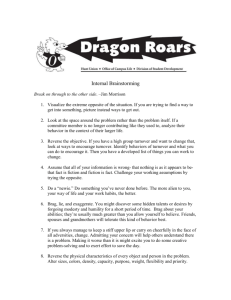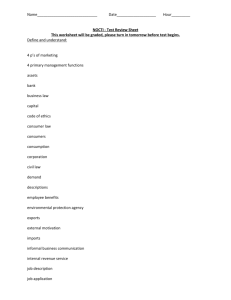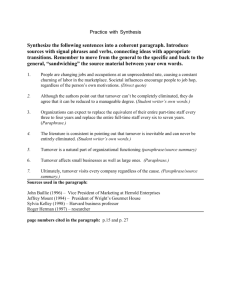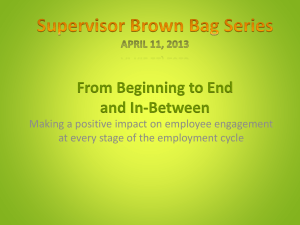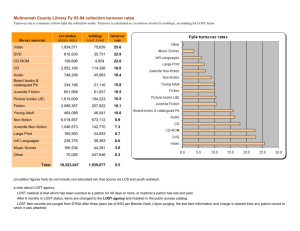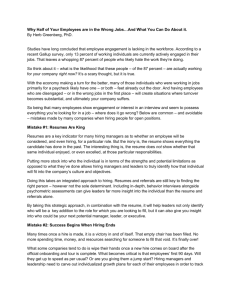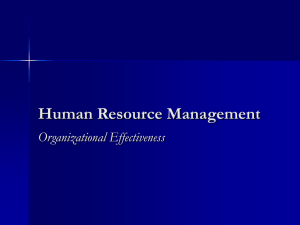Employee Turnover: Who's At Fault?
advertisement
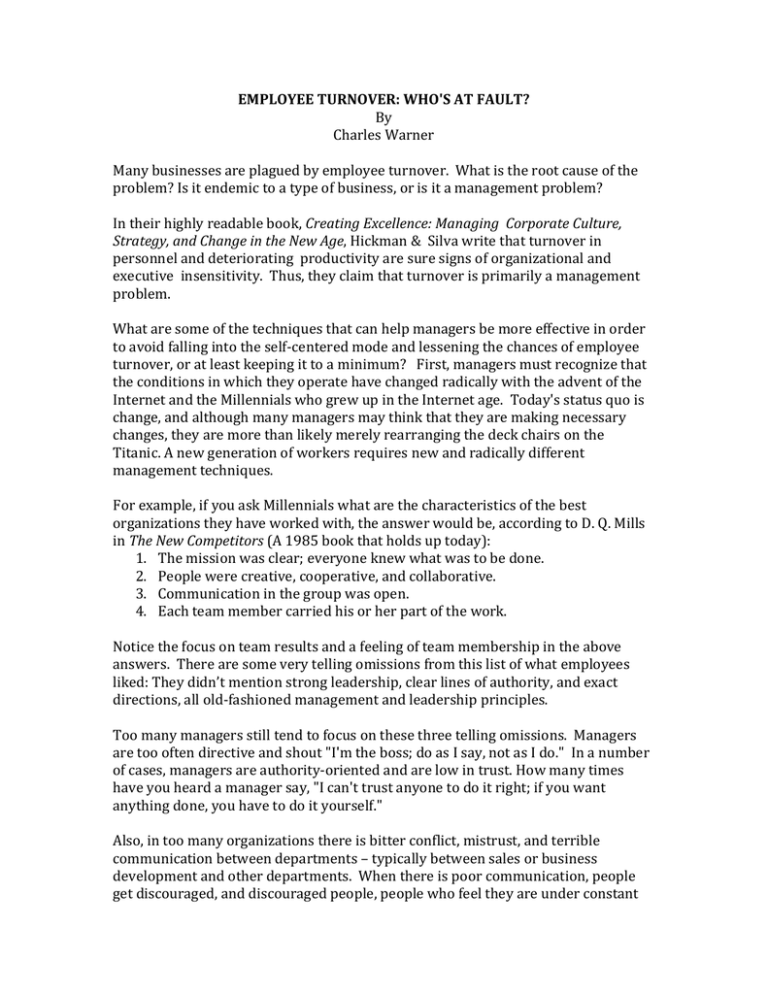
EMPLOYEE TURNOVER: WHO'S AT FAULT? By Charles Warner Many businesses are plagued by employee turnover. What is the root cause of the problem? Is it endemic to a type of business, or is it a management problem? In their highly readable book, Creating Excellence: Managing Corporate Culture, Strategy, and Change in the New Age, Hickman & Silva write that turnover in personnel and deteriorating productivity are sure signs of organizational and executive insensitivity. Thus, they claim that turnover is primarily a management problem. What are some of the techniques that can help managers be more effective in order to avoid falling into the self-centered mode and lessening the chances of employee turnover, or at least keeping it to a minimum? First, managers must recognize that the conditions in which they operate have changed radically with the advent of the Internet and the Millennials who grew up in the Internet age. Today's status quo is change, and although many managers may think that they are making necessary changes, they are more than likely merely rearranging the deck chairs on the Titanic. A new generation of workers requires new and radically different management techniques. For example, if you ask Millennials what are the characteristics of the best organizations they have worked with, the answer would be, according to D. Q. Mills in The New Competitors (A 1985 book that holds up today): 1. The mission was clear; everyone knew what was to be done. 2. People were creative, cooperative, and collaborative. 3. Communication in the group was open. 4. Each team member carried his or her part of the work. Notice the focus on team results and a feeling of team membership in the above answers. There are some very telling omissions from this list of what employees liked: They didn’t mention strong leadership, clear lines of authority, and exact directions, all old-fashioned management and leadership principles. Too many managers still tend to focus on these three telling omissions. Managers are too often directive and shout "I'm the boss; do as I say, not as I do." In a number of cases, managers are authority-oriented and are low in trust. How many times have you heard a manager say, "I can't trust anyone to do it right; if you want anything done, you have to do it yourself." Also, in too many organizations there is bitter conflict, mistrust, and terrible communication between departments – typically between sales or business development and other departments. When there is poor communication, people get discouraged, and discouraged people, people who feel they are under constant surveillance, and people who feel they are not appreciated quit. They create one of a business’s biggest problems – turnover. The first area for managers to address in trying to cut down turnover is their recruiting and hiring practices. It is obvious that they should constantly recruit and look for intelligent, highly motivated, hard-working, independent people – the best people they can find. In hiring, managers tend to place too much emphasis on experience and too little emphasis on raw talent, brains, and problem-solving abilities. By placing too much emphasis on experience, managers tend to perpetuate other, previous manager's mistakes, and tend to make the terrible mistake of not always hiring someone smarter than themselves. Managers should place much more emphasis on training. The best managers are those who coach their people to become more productive, not those who merely direct people to “get it done.” According to a 2014 Harvard Business Review article, Google’s best managers demonstrated the following behaviors: 1. Is a good coach. 2. Empowers the team and does not micromanage. 3. Expresses interest in and concern for team members’ success and personal well-being. 4. Is productive and results oriented. 5. Is a good communicator – listens and shares information. 6. Helps with career development. 7. Has a clear vision and strategy for the team. 8. Has key technical skills that help him or her advise the team. Considering that Google is considered the best place to work in America (FORTUNE magazine, 2011, 2012, 2014), especially for young people, if you want to reduce turnover and retain smart young workers you probably should memorize these eight management behaviors Google considers vital. Next, when managers interview people, they often hire the first warm body that walks through the door just because of the urgency of filling an open slot. Hiring practices should include: 1. Interviewing applicants at least three times (five is better. Google interviews up to 11 or 12 times, Goldman Sachs sometimes interviews up to 30 times) before hiring. 2. Having a preplanned, written guideline of the questions to ask all candidates for similar jobs (and asking the same questions in the same order in every interview). 3. Taking notes on their responses. 4. Writing brief evaluations after each interview. 5. Giving applicants some sort of project that tests their skills. 6. Having some sort of objective, numerical ranking system for all candidates. Deliberate, systemized hiring is one of the best forms of insurance against turnover. However, the biggest cause of turnover is management's insensitivity to employee's personal needs. Managers should learn the first Golden Rule of management: treat employees the way the employees like to be treated. Unfortunately, too many managers automatically, unconsciously adopt the style of their previous or current managers without stopping to think, "Am I treating my people the way they would like to be treated?" Hickman & Silva list five blocks to sensitive management on the part of managers: 1. Assuming they know other's expectations and needs without discussing their needs with them. 2. Treating all employees the same regardless of individual differences. 3. Viewing employees as tools or production units, not as people. 4. Seeing employees as they once were and not recognizing changes or improvements. 5. Believing employees should respond the way the managers would respond in the same situation. To overcome these sensitivity blocks, Hickman & Silva recommend the following: 1. Sensitivity to people's security expectations and needs. a. Managers should dedicate themselves to their people's physical wellbeing, environment, working conditions, compensation, supervision, and benefits. Managers should fight for the best of all of these for their people. Managers should conduct attitude surveys to find out how employees feel about their work environment, or have them go to lunch and gripe anonymously to an employee they select and trust and who brings back to management their comments and criticisms. Outside consultants can also perform this task quite well--employees often open up better to outsiders. 2. Sensitivity to people's belonging expectations and needs. a. Managers should involve themselves in scrutinizing the social interaction, group dynamics, team feeling, participation in decision making, and sense of family their people experience. Managers should create an atmosphere of mutual trust and respect. 3. Sensitivity to people's recognition and progress expectations and needs. a. Managers should evaluate thoroughly how and when their employees get formal and informal recognition via oral and written praise, promotions, bonuses, awards, honors, and other means. The need for recognition is universally strong, and every organization should have a formal system for praise and recognition, because it may be a cliché, but there is universal truth in the fact that a little bit of recognition goes a long way (and, by the way, saves a lot of money). Managers must find creative, new ways to give people recognition and to celebrate small wins in order to let people know they are making progress. According to Daniel Pink, one of our strongest motivators is the inherent need for mastery. We all want to be good at something and to know that we are making progress toward that mastery. So, give people recognition that they are doing well and making progress in improving. 4. Sensitivity to people's quality-of-work expectations and needs. a. Managers should define the sort of work people find interesting, challenging, and inspiring and find ways to match people with the tasks that are most satisfying and motivating to them. For example, job sharing can get people involved in areas that interest them. 5. Sensitivity to people's self-actualization expectations and needs. a. Managers should know their people well enough to know what their dreams are. Good managers understand their employees' dreams and show them how to achieve them through performance on the job. Remember, most people dream of winning, so good managers make everyone feel like a winner. If people are treated like they are losers, they will fulfill that expectation. Employee turnover can be cut down in most organizations dramatically simply by better, caring, more understanding management. If an organization has high turnover, management should look in the mirror for the source of the problem. REFERENCES Amabile, T. & Kramer, S. (2011). The Progress Principle: Using Small Wins to Ignite Joy, Engagement, and Creativity At Work. Harvard Business Review Press. Boston. Hickman, C.R. & Silva, M.A. (1984). Creating Excellence: Managing Corporate Culture, Strategy and Change in the New Age. New American Library. New York. Mills, D.Q. (1985). The New Competitors. John Wiley & Sons. New York. Pink, D. (2010). Drive: The Surprising Truth About What Motivates Us. New York: Riverhead Books.
